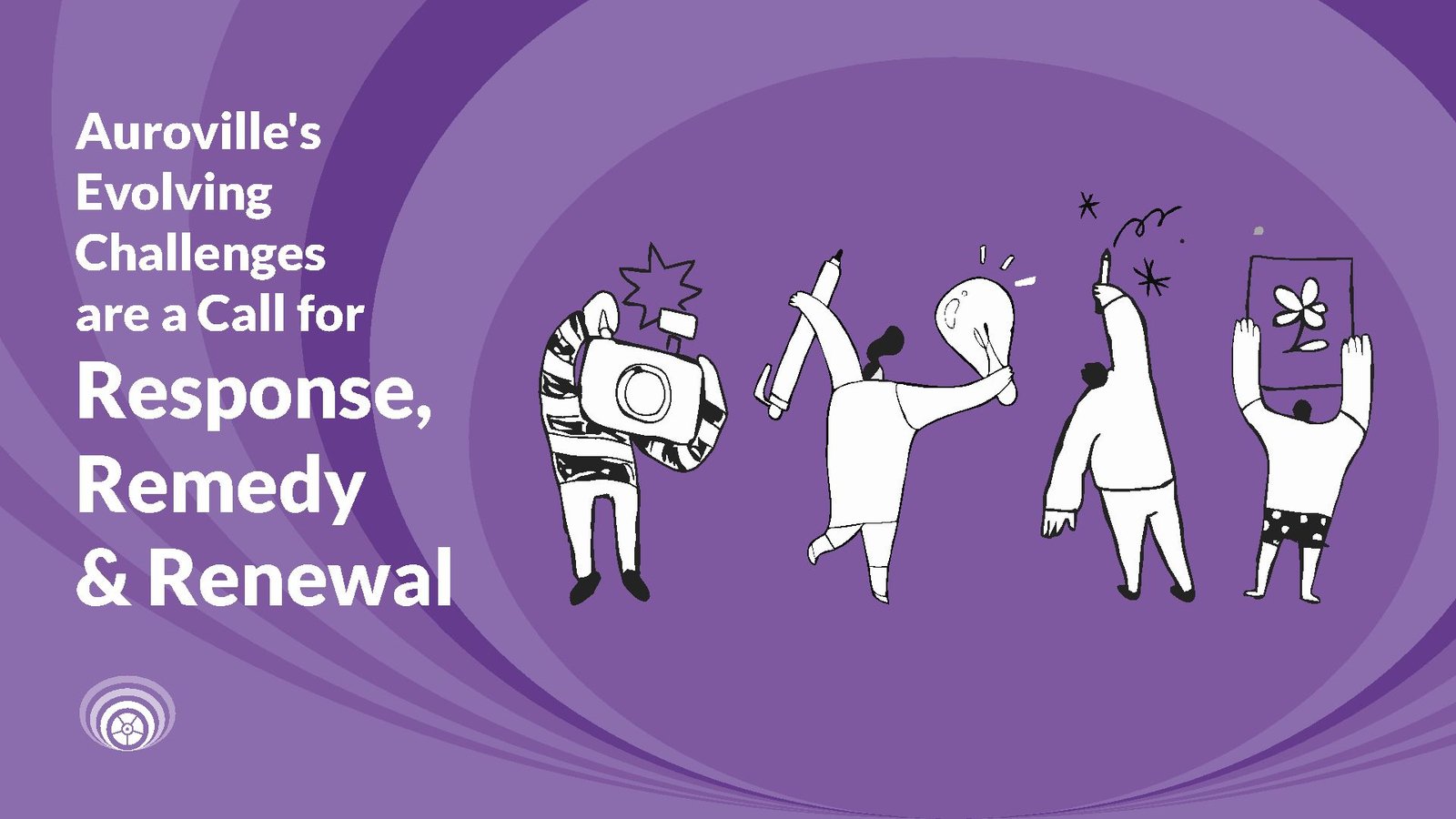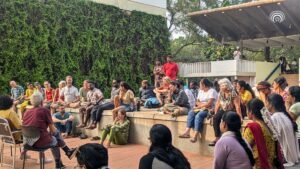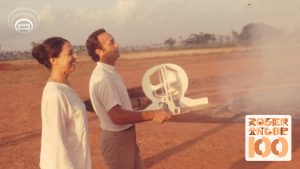
In response to the recent video (Link) on the proposed changes to the Residents Assembly Service (RAS) and the discussion surrounding it, I find myself reflecting deeply on the core values of Auroville and the challenges we are currently facing. The dialogue during the meeting, while highlighting procedural and technical aspects, raises important questions about our collective direction, participation, and trust in the process.
Auroville, envisioned as a Universal Township, was founded on the ideals of Human Unity and a collective aspiration toward a higher consciousness. However, as the meeting discussion revealed, we seem to be grappling with issues that distract from this greater goal. The proposal to reform the RAS and introduce a new mandate is essential, but the real challenge lies not just in these procedural tweaks, mumbo-jumbo in legalese language, bureaucratic acrobats, but in addressing deeper systemic issues.
As a collective, Auroville must remain a living experiment, an active laboratory. Stagnation or resistance to change can hinder the progress and dynamism necessary for us to move forward. The past few years have shown us that our structures, no matter how well-intentioned, are not immune to the external pressures of governance, internal power struggles, perfunctory decision-making, active inactions, and conflicting visions. Unfortunately, though the challenges are constantly evolving, Auroville’s response is not. The recent meeting called by the influential families, and attended by the family friends, to discuss the pre-ordained proposals, presented novelly by titular working group members is why an immediate remedy and renewal of the RAS is necessary, which is universal and not a family franchise. Most importantly, we also need to collectively align with the very spirit of Auroville to achieve the deeper transformation we all seek.
While the RAS claims to support participatory decision-making, the video presentation falls short in addressing Auroville’s fundamental ideals and the practical realities on the ground.
Trust and Transparency: The Backbone of Democratic Governance
The issue of anonymity in voting is crucial, and the presentation rightly highlights the fear many residents feel about participating in the voting process. However, it fails to deeply explore the root cause of this mistrust—a lack of transparency. While efforts to ensure vote confidentiality are mentioned, this alone cannot mend the erosion of trust over time. Residents should feel confident not only that their votes are anonymous but that the overall process is free from manipulation. The presentation lacks concrete steps to rebuild this trust, relying on vague reassurances rather than tangible reforms.
Swedish Lisa’s observation that certain nationalities (e.g., the Dutch) vote more than others (Indians vote the least) adds weight to the argument that the voting process is scrutinized and potentially misused by a specific demographic. This scrutiny breeds fear and alienation, further deterring residents from engaging, leading to an imbalance in decision-making participation. The presentation should have tackled these inequities and put forward proposals to foster inclusivity and fairness in the voting system, rather than glossing over them.
Furthermore, the video brings to light that certain foreign members of the Working Committee are frankly assuring their family and friends that their names and votes will be “safe.” But safe from what? From the Governing Board or the Government of India? This is outrageous and reveals an alarming mindset. These foreigners, who have been graciously hosted by India for years, are now scheming against the very government that has offered them love and support. The colonial mentality lingers in some Western minds, so entrenched in their outdated sense of superiority that they don’t even recognize the malice in their actions. By openly expressing opposition to the Government of India, they display a deep disregard for the laws and governance of the country that has welcomed them, which must be addressed seriously if Auroville is to thrive as a place of unity and respect.
A Rigged System in Disguise?
The gathering – where the average age of attendants is three times the attendance – sheds light on deeper structural issues within the so-called “elected” bodies in Auroville, where the same families have rotated power for decades. The RAS presentation fails to engage with this critical reality, instead offering an overly simplistic view of the decision-making structures. An old-time political figurehead of the influential family, also expressed his penultimate final wish to have RAS members term to be for life, coupled with the power to recall those who do not fall under his influence. When “elections” are described, they are revealed to be more of a symbolic gesture to score brownie points in the court rooms than a genuine mechanism for change. The outcomes are predetermined, and the turnout numbers highlight that the vast majority of residents don’t even bother to participate—indicative of deep-rooted cynicism towards the process.
How can RAS claim to serve participatory governance when the decision-making process is tightly controlled by a small group? This monopoly over power should be openly addressed and rectified if Auroville is to truly embody the values it was founded upon. The real issue is not a lack of resident participation but the sense of futility many feel in attempting to bring change through an inherently biased system. The presentation should have taken a hard stance on these undemocratic practices, rather than tacitly endorsing them.
Previous RAS Mandate was invalid ?
Since the RAS and Council officials admitted on record that the RAS mandate is insufficient, the presentation raises more questions than it answers. If the flawed mandate has not been sufficient and valid since 2007, then every decision the RAS has facilitated since that time stands on shaky legal and ethical grounds. This raises an existential question: What authority has the RAS operated under for the last decade or so? And if the RAS did not have a valid valid mandate, is it not time to question whether any of its past decisions should be upheld? The presentation glosses over this critical point without providing a meaningful resolution or plan to restore legitimacy.
Auroville’s Ideals = Democratic Structures ?
The most glaring omission in the RAS presentation is a clear alignment with Auroville’s core philosophy as outlined by Sri Aurobindo and The Mother. Auroville is not, and was never meant to be, a participatory democracy in the conventional sense. The Charter calls its residents “willing servitors of Divine Consciousness,” and this is a spiritual calling, not a call for citizens to engage in a political process. Sri Aurobindo and The Mother were critical of democracy, warning that it inevitably leads to the creation of parties, competition, and the pursuit of votes—all of which are inherently divisive and at odds with Auroville’s goal of unity and higher consciousness.
By pushing a model of participatory governance without critically examining its fit within Auroville’s spiritual ethos, the RAS risks undermining the very foundations of the collective being. The presentation should have reflected this deeper understanding of Auroville’s purpose, rather than attempting to shoehorn it into a political model that is universally accepted as a valid and legal instrument of division, manipulation, and control.
Reimagining Governance in the Spirit of Auroville
Rather than perpetuating a broken system, the presentation should have been a call to reimagine governance in a way that reflects Auroville’s true ideals. How can decisions be made in a manner that reflects higher consciousness, collaboration, goodwill and truth? How can we evolve past outdated political structures and create a system that honors the unity and spiritual aspirations of the City the Earth needs?
The RAS could be a vehicle for innovative decision-making that doesn’t rely on conventional voting but instead focuses on deep consensus, inner alignment, and the will to serve the Divine Consciousness. By not addressing these critical points, the presentation misses the opportunity to spark a much-needed transformation in Auroville’s organisation.
A Call for Renewal
The discussion in general about the renewal of the RAS is welcome, if it reflects a larger issue within Auroville. We need to renew our commitment to the ideals that Auroville was founded on. This means not just engaging in procedural debates but also engaging in a deeper reflection on what kind of collective we wish to be. It is time to move beyond the small disagreements and power struggles and focus on the larger vision. The world is watching Auroville closely as a beacon of hope, an experiment in Human Unity. We cannot afford to be bogged down by bureaucracy of hatred, governance of fear, and judgment of despair. We need to be inventive, creative, and, most importantly, a little bit active.
The proposed new mandate for the RAS is a dodgy step in a downward direction, but it is only one part of the larger challenges that Auroville is facing. As residents, we need to embrace the bold changes that are necessary to move forward while holding true to our foundational values. Trust, transparency, participation, and innovation must be at the heart of any reform we undertake.
Let us not lose sight of our ultimate goal—Human Unity, the City the Earth needs, and the adherence to the Auroville Charter. The challenges we face today are not insurmountable, but they require us to come together, to listen to each other, and to be willing to embrace the new while honoring the old. This is the way forward for Auroville.





